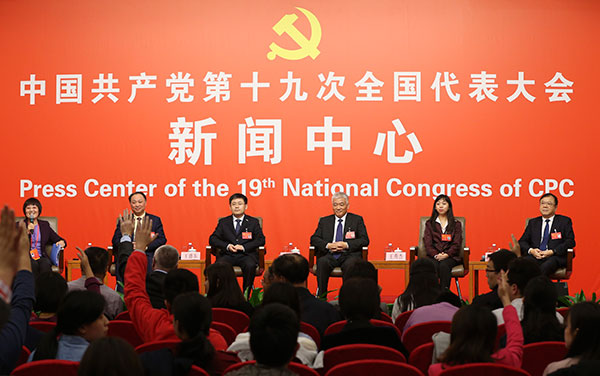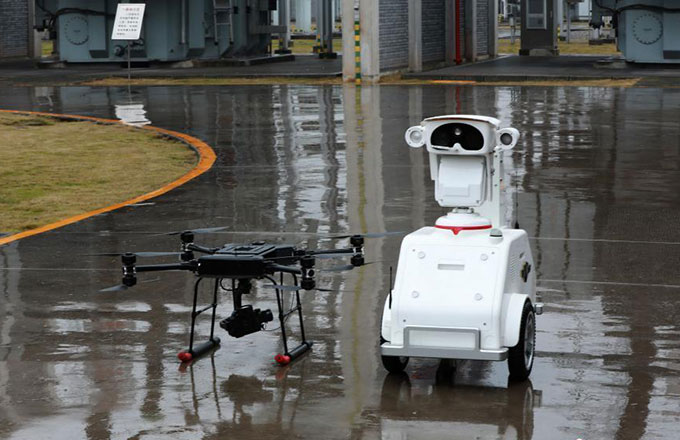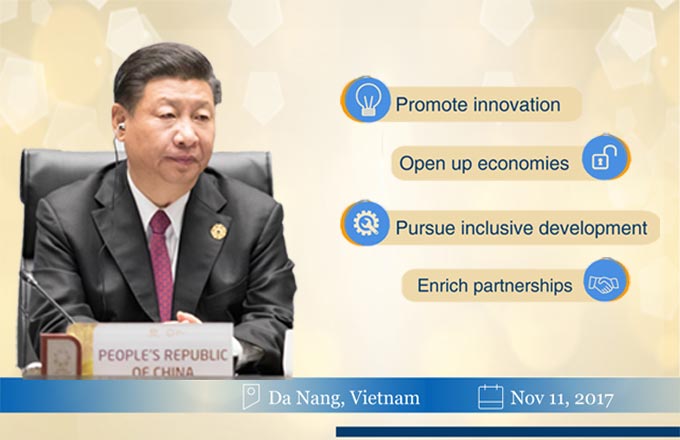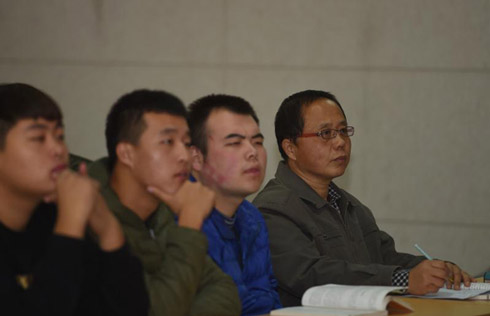China boosts plans to motivate its scientists
Technological innovation seen as key to socioeconomic progress
 |
|
Delegates attend a news briefing on innovation-driven growth at the 19th National Congress of the Communist Party of China on Friday. Attendees who answered reporters' questions include Jiang Fengyi (second from left), deputy head of Nanchang University; Wang Endong (third from left), chief scientist at Inspur Group; Wang Zhigang (third from right), vice-minister of science and technology; Wang Xiujie (second from right), a researcher at the Chinese Academy of Sciences; and Lu Jianjun (right), head of science and technology in Shaanxi province. FENG YONGBIN/CHINA DAILY |
China is stepping up efforts to build a "fair and just" ecosystem to better motivate science talent and facilitate technological innovation, a senior official said on Friday.
Since 2012, China's science and technology has "generally, and in some cases fundamentally, affected China's socioeconomic development", Wang Zhigang, vice-minister of science and technology, told reporters at a briefing at the 19th National Congress of the Communist Party of China.
China's gross expenditure for research and development grew from 1.03 trillion yuan ($156 billion) in 2012 to 1.57 trillion yuan in 2016, with 77.5 percent being spent by enterprises. China also has topped the world for the six consecutive years in patent applications, including 1.34 million in 2016, more than double that in 2012, according to the Ministry of Science and Technology.
Those achievements are fueled by a total of 3.81 million science workers, the largest group in the world. "Innovation cannot be achieved solely by scientists in ivory towers. It has to be integrated closely with the economy, society, people's livelihood and national security," Wang said.
As a result, the bulk of the reforms need to focus on motivating science workers, and "creating a more fair and just ecosystem to support technological innovation", he said.
Such an environment will include supportive legal, political, cultural and social elements, Wang said. At the same time, governments should strengthen basic research, improve science literacy and let the market economy play its role. "We try to let everyone find their value in their innovation, and make scientists happy," he said.
To achieve these goals, Wang said China needs three ingredients. The first is a top-down blueprint to "organically bind innovation to China's socioeconomic development and modernization process".
The second is clarifying "who should do what". The main drivers of Chinese innovation are research institutes, universities and companies, and they have helped China take the lead in several important fields ranging from artificial intelligence to quantum communication, he said.
Chinese science enterprises had total operating revenue of 26.1 trillion yuan in 2016, up by 17.5 percent annually. Technology contracts' value passed 1 trillion yuan in 2016, up 77.2 percent from 2012, according to the science and technology ministry.
Still, companies and universities may not be able to do massive basic scientific research, such as China's recent contribution to the discovery of a new gravitational wave, because it requires national support, so government should play the leading role, he said.
As a result, the third part is stepping up efforts in basic and application research, technology innovation and commercialization, to "greatly improve our industries' competitiveness and the general strength of our economic development", Wang said.
Wang Xiujie, a biologist at the Chinese Academy of Sciences and also a delegate, said China has simplified procedures in areas like project applications and budget requests, "giving front-line scientists a lot of flexibility".
Wang Endong, chief scientist of Inspur Group, China's largest server maker, said companies are treating science workers better. The government also approved policies on housing and schooling support for science workers.
























